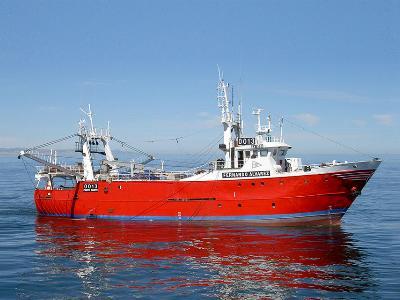China demand driving domestic, foreign investments in Argentina shrimp

A rise in sales of Argentinian shrimp, particularly driven by stronger Chinese demand, has encouraged several Argentinian and foreign companies to invest in increasing their production.
These include some of the largest exporters in the country.
Newsan, the largest Argentine seafood firm in turnover, is investing in new vessels and a freezing plant. Iberica de Congelados (Iberconsa), based in Vigo, Spain, has also been expanding its fleet and processing capacity in the South American country.
The strong catches and sales of red shrimp have also triggered foreign firms' interest in acquiring Argentinian companies, particularly among Chinese investors. Continental Armadores de Pesca (Conarpesa), the largest sea-frozen player, is currently said to be in sale talks to a Chinese firm.
China has imported more than double the quantity of Argentinean shrimp in January-September of 2016 than the same period of the previous year.
In January-September, Argentinian shrimp exports to China rose to 26,146 metric tons, up 140% year-on-year, according to latest figures.
During the month, China was the second largest importer of Argentine shrimp after Spain. The total Argentinian shrimp exports in January-September rose to 114,918t, up 43% y-o-y.
The massive surge in exports to China were also partly driven by demand from processors for re-export, as well as for the booming domestic demand.
Stronger sales have encouraged several Argentinian companies to invest in new plants and vessels.
For example, Newsan plans to increase production by 15% in two years, as well as further diversify its output.
In order to increase its production of shrimp, Newsan is building two additional vessels, which will be operative by mid-2018. The firm is also carrying out an exploration in southern Argentina to see if it is possible to catch king crab.
Iberconsa, which is backed by private equity Portobello Capital, put an individually quick frozen line in its plant in the South American country in time for the in-shore shrimp season, as well as bringing in four additional shrimp vessels. It also bought an additional trawler with 2,000 metric tons of hake quota, and four additional vessels in Argentina.
These investments took the company’s shrimp fleet to eight, and its hake fleet to four.
Meanwhile, several fishing groups have been in discussion with potential buyers.
A group named Dalian Huafeng Aquatic Products was being tipped by Undercurrent sources as the firm eyeing a deal for Conarpesa’s offshore vessels. The transaction among the two firms, however, has seemingly changed terms during the negotiation.
At a later stage of the negotiation, the Chinese firm was going to buy only five-eight units and the individual unit price was still being discussed, while Conarpesa would keep the wet shrimp trawers, according to one source. The outcome of the negotiation is still unknown.
The negotiation for potential acquisition of fishing firm Solimeno Group, said to be from China's Shanghai Fisheries General (Group), fell through and then restarted, according to some Argentinian sources.
“Strong shrimp catches this year increased interest from investment-hungry companies. It is normal that several groups move, analyse options, generating noise,” a source said. “But, at the moment, there is a lot of noise and little action,” he added.
Other Chinese companies have already made moves into Argentina, such as Shanghai Fisheries.
Back in 2014, Shanghai Fisheries paid $21.5m for a 100% interest in Argentine fishing company Altamare from Spain’s Armadora Pereira, via its subsidiary Shanghai Jinyou Deep Sea Fisheries Company.
The deal gave Shanghai Fisheries three shrimp fishing vessels and a jigger for squid, plus a processing plant in Puerto Madryn. In 2015, Altamare exported 9,378t of seafood, worth $32.57m.
Argentinian exports to China pay an entry levy of up to about 16% to export to the Chinese market and they are therefore disadvantaged to compete with Chinese exports from Argentina to China, which are not taxed, Argentinian sources said.
In the meantime, Chinese firms have started to negotiate investment in Argentinian neighboring country Uruguay, where a Chinese investor also plans to put $200m into a fishing port.
Có thể bạn quan tâm
Phần mềm

Phối trộn thức ăn chăn nuôi

Pha dung dịch thủy canh

Định mức cho tôm ăn

Phối trộn phân bón NPK

Xác định tỷ lệ tôm sống

Chuyển đổi đơn vị phân bón

Xác định công suất sục khí

Chuyển đổi đơn vị tôm

Tính diện tích nhà kính

Tính thể tích ao hồ



 Teppanyaki chain Benihana sues Bama Sea alleging shrimp…
Teppanyaki chain Benihana sues Bama Sea alleging shrimp…